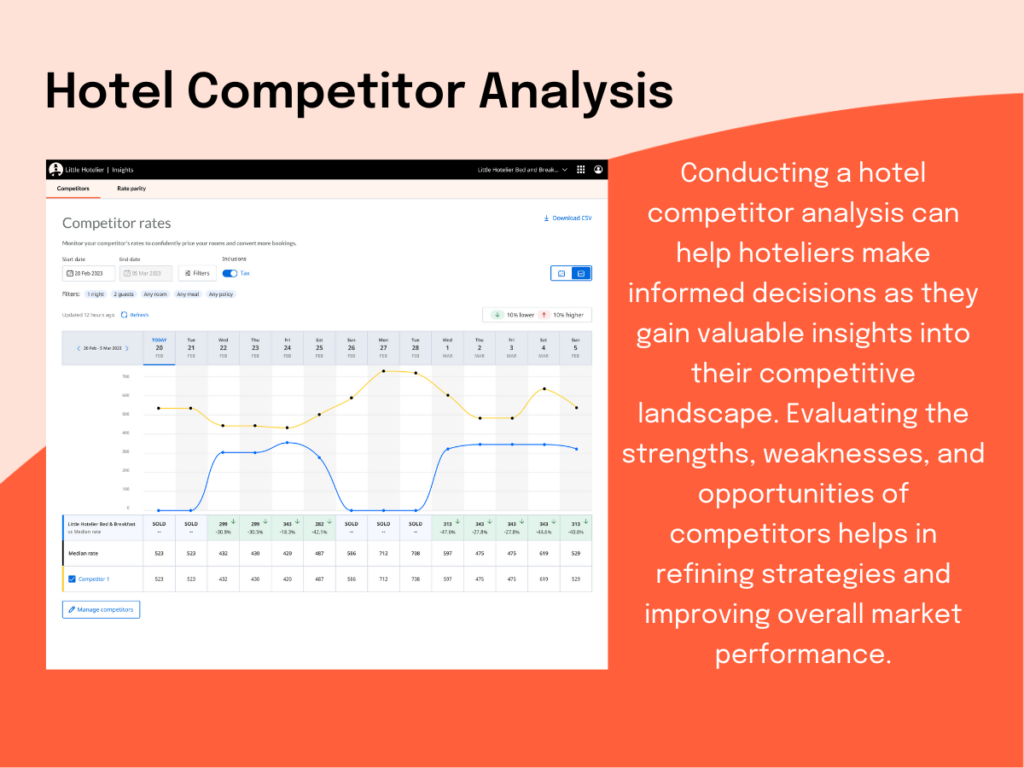What is a hotel competitor analysis?
A hotel competitor analysis allows your hotel or small accommodation to compare the strengths and weaknesses of your local peers with your own business, so you can work on being the most attractive option for visiting travellers.
Running a small hotel or accommodation can be a rewarding experience, but it’s important to understand the local market to stay competitive.
Imagine you run a cosy bed and breakfast, and a nearby hotel offers similar room rates. However, your guests rave about your delicious homemade breakfasts and personalised recommendations. This highlights your unique selling points, potentially allowing you to adjust your rates to reflect the additional value you provide.
By understanding the broader market landscape, you can position your accommodation for success and maximise your earning potential.
This guide will equip you with the knowledge you need to conduct a competitor analysis for your small accommodation, allowing you to make informed decisions and thrive in the local market.
Never miss a trick with Little Hotelier
Use Little Hotelier’s insights feature to keep a keen eye on the local market and make strategic decisions.
Learn moreWhat is the purpose of analysing your hotel competition?
Analysing your hotel competition is a very effective way of identifying tactical opportunities for your business and also see ways that you can improve your services or overall strategy.
It helps you:
- Compare your offerings: See how your amenities, services, and pricing stack up against similar accommodations in your area.
- Identify your unique selling points: Discover what sets you apart from the competition, whether it’s personalised service, a charming atmosphere, or a unique location.
- Make informed decisions: Gain insights to adjust your pricing, enhance your guest experience, and attract more visitors.
In today’s market, it’s important to use any data that you have at your disposal to make decisions. Ultimately, by finding weaknesses or identifying strengths in your competitors, competitive analysis can help you maximise revenue for your own business.
What is a hotel comp set and how do you find it?
A hotel comp set is a group of hotels and properties that you will compare yourself to. In most cases it will involve the providers closest to you in your local area but there are other factors you can use too, which can help you put a more accurate analysis together:
- Proximity – Accommodations that are physically close to yours, even if they offer a slightly different experience or price, can be considered competitors.
- Positioning – How you seek to market to guests. For example, if you are a budget property, you would compare yourself to other budget accommodations.
- Price – Any property that has similar rates to yours should be looked at as a close competitor.
- Product – Are there properties in the area with a very similar room structure and amenities? This would also be a key competitor to analyse.
Finding your comp set is often the first step in performing your competitive analysis.

Key outcomes of hotel competitive analysis
Implementing an accurate and effective hotel competitive analysis will open up a number of opportunities for your business. Here are some outcomes you can expect.
1. You’ll understand your position in the market
By the end of your analysis you should have a better idea of whether you are sending the right message, and marketing your property in a way that plays to its strengths.
2. You’ll know exactly who to target
Your analysis might highlight some areas to improve, such as which guest types to target and how to target them. For example, maybe you find that in certain seasons you see more of a certain demographic. This will allow you to offer specific deals, packages, and rates to maximise bookings and revenue.
3. You’ll know how to supercharge your services
Is there anything your competitors are offering that you aren’t and should be? Is there something you think guests would appreciate enough to bring them to you instead of your competitors? You may be able to implement valuable upsells and add-ons.
4. You’ll have a clearer pricing strategy
Guests will only book with you if the price is right – that means they think they’ll get value for money or they think their experience will be worth securing a reservation. Your analysis will ensure you’re always offering a price that is profitable for you and reasonable for your guests.
5. You’ll know how to sell your inventory
Some online booking channels (Booking.com, Expedia, Airbnb etc) may be more lucrative for you than others. For example, if you see a high number of cancellations on one channel compared to others, it could be worthwhile for you to replace it.
How to perform your competitive positioning analysis
There’s a step-by-step process you can follow to perform your competitive positioning analysis, which includes:
- Establishing your comp set – Select which properties are appropriate to compare based on our definitions above.
- Analyse attributes – Look at strengths and weaknesses between all the properties, including yours. Then give everyone a score. This might be based on a combination of rates, value, services, reputation, location, and more.
- Identify opportunities – Decide what changes you can make to get a bigger share of the market or boost your profit. Maybe it’s a case of offering additional packages, so your value beats that of your competitors, or using dynamic pricing strategies to attract price savvy customers at all times.
Hotel competitor analysis example
As part of your competitor analysis, you can plot a graph with scores that compare your hotel and your competitors.
An example might look like this:
Source: SiteMinder
This visual representation will put things in perspective for you and give you a better idea of how you want to move forward.
By Dean Elphick
Dean is the Senior Content Marketing Specialist of Little Hotelier, the all-in-one software solution purpose-built to make the lives of small accommodation providers easier. Dean has made writing and creating content his passion for the entirety of his professional life, which includes more than six years at Little Hotelier. Through content, Dean aims to provide education, inspiration, assistance, and, ultimately, value for small accommodation businesses looking to improve the way they run their operations (and live their life).
Table of contents
“Little Hotelier is professional and much appreciated. For a small hotel like ours, the ability to quickly change rates and availability is crucial.”
Owner, Soloqui in Zero Branco









Maneerat Wiriyarat,
Owner
Long N Joy Samui Apartment Service